In Their Own World
Students from abroad change the Bates horizon as much as the College transforms them.
By Phyllis Graber Jensen
Lesley Boakye-Danquah ’03 of the United Kingdom shared a gift with the Bates community at last year’s international fair. Glowing, she wore a beloved dress handmade by her grandmother, in the red, yellow, and green colors of the Ghanaian flag.
I did not talk with her then, but I carried a memory of her in that dress for several months. I knitted that memory together with other impressions gathered of international students. Some I had photographed — in the classroom; or in Muslim, Buddhist, or Hindu prayer; or downtown in Lewiston or Portland tutoring children — and still others I had spoken with. Always, I was struck by three qualities: their strong sense of self, a tremendous thirst to explore new opportunity, and a generosity of spirit.
I sat with Ngan Dinh ’02 in the Den recently. I asked her to describe the traditional dress she wore when I photographed her (page 35). “When you think about Vietnam, you think about the ao dai,” she said (ao dai means “long dress.”) “When I wear it, I feel very Vietnamese, very Hanoi, very much a woman.”
International students like Ngan Dinh bring that vivid sense of self-identity to the Bates campus. They share themselves with our community, trusting that our community will, in turn, share with them.
In the last few years, the international presence on the Bates campus has grown, in response to a stepped-up international-recruitment effort. “The liberal arts concept is gaining a foothold around the world,” said Kim Ma Gustafson, associate dean of admissions and coordinator of international recruitment at Bates.
Technology, too, has helped colleges like Bates increase their international visibility. Sameer Maskey ’02 of Kathmandu, Nepal, didn’t use a computer until he was in high school. He would visit a local cybercafe to get online and, eventually, search for colleges. One day several Bates students, who were studying in Nepal, noticed Maskey e-mailing a friend about his acceptance to Bates. They took time to talk to Maskey about Bates, urging him to attend. Now he studies computer science along with his chosen majors, physics and math.
“Many regions, including Asia, Africa, and Europe, have traditionally offered exam-based educational systems which track students into majors very early on,” Gustafson said. “But these students are not always well prepared in the areas of writing, problem solving, and critical thinking. Liberal arts graduates are often known for having a broad range of skills, so people around the world are recognizing the value of an education from a place like Bates.”
— Phyllis Graber Jensen
 Robbie Ruttman ’03
Robbie Ruttman ’03
Port Elizabeth, South Africa
Majors: Economics and German
My mom and dad are from Dresden, Germany, and they escaped from Germany before the wall was erected. Neither has a high school education.
One day as I was working at the Mays Center, I suddenly realized: I’m a kid from a seemingly rural town in South Africa. I was awarded a $3,000 Stangle grant to do thesis research in Brussels this summer with the Economic Planning Commission, on the long-term impact of single European currency. During Short Term, I was going with two academic experts as guides and resources through the huge country of China. I was also flying for four days to Hong Kong, before going on for eight weeks to Europe. I thought, “Wow, that’s kind of amazing. It’s an opportunity to change myself.”
Bates has afforded me the opportunity to engage in so many diverse experiences: debate, student government, and being a member of the Student Conduct Committee. Bates allows me to take the road less traveled, to expand my comfort zone in a supportive environment. At first, I was somewhat intimidated by the workload, but if you have a problem, professors work with you to improve. They are interested in the growth of young people. One of the most important parts of being a student is recognizing that capacity for improvement.
Bates believed in me and trusted me. That responsibility has challenged me and helped my self-confidence. Often, the responsibilities haven’t been easy. I’ve had to ask for help. I’ve really worked hard to test myself. Knowing I can handle the challenges and having people believe in me, my confidence grows.
Prerana Shrestha ’03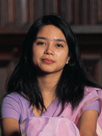 Kathmandu, Nepal
Kathmandu, Nepal
Major: Biology
At home, I’d be studying biology or medicine. At Bates, I can take economics, dance, art, or live in the Spirituality House. Back home, I’m in my little world. Here, in such a small place as Lewiston, I’ve been exposed to cultural diversity and career options. Through Bates, I’ve done a CDIP internship and summer research at NYU Medical Center that have been really helpful to explore fields I might want to enter later on. I want to go into medicine: I’m interested in hematology and cancer, and the supply of blood in benign or malignant tumors.
My thinking has become more open minded, especially about all kinds of relations, between genders, between professors and students. People here are really free; they talk about anything. At home, you must talk only about homework. Professors are not welcoming of student input, as here. Gender, too. Back home, there are friendships between the sexes, but there is definitely a wall. Back home, if I were to say, “I’m working in a restaurant washing dishes,” my family would feel badly. Here, nothing is demeaning. You’ll still respect someone from a different class.
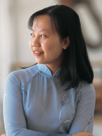
Ngan Dinh ’02
Hanoi, Vietnam
Majors: Economics and Japanese
In my first year here, I lost my confidence. Because of the culture and language barriers, during my first two years at Bates I had to focus on academics. I didn’t have the courage to speak with people. I felt inferior to them. I found my confidence again this year. I’m doing service-learning. I am on the budget committee for the RA, allocating funds for clubs and organizations on campus, and next year I will be a JA — although I will be a senior — in the Bill.
Lewiston has become my home; this is where I live. Last summer, I worked with very little kids and felt really happy because it was not just academic work. I was doing something for my new home. Three times a week, I would ride my bike from Bates to the Multipurpose Center, and the children would call “Hi Ngan!” as I arrived.
America is different in many ways from Vietnam, but American kids are not different from Vietnamese kids. When you ask little children in Lewiston or in Vietnam, “How much do you love your mother?” all kids throw their arms open wide and say “This much!”
At Bates, you participate in a variety of activities, not just academics. At home, the political system is different. Our work is assigned, and we have less chance to develop in our creativity. It takes a lot more time to develop an idea. Here, when I have an idea, there is always someone to tell me where to go, how to take the next step. Everything here is possible as long as you have the willingness to serve.
The payoff from education is that I love being with people. I am doing some small things for people, but when you make a lot of little differences, it adds up to making a big difference.
Sorubh Mahadoo ’03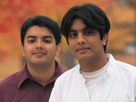 (far right)
(far right)
Quatre-Bornes, MauritiusMajor: Physics
I’ve never had an international experience before. Growing up, I encountered stereotypes about other cultures. Bates has opened my eyes about people from other cultures. One stereotype: American students are unfriendly, not approachable, not on a common ground. But I’ve learned that they are friendly, and we do have things in common. We all have the same problems. We worry about studies, the future — what we will do after Bates. We’d like to please our parents and to be successful.
Neeraj Mahadoo ’01
(on the left)
Quatre-Bornes, Mauritius
Major: Chemistry
At home, I had been in the family cocoon. Arriving here, I experienced the culture shock of the college and of the country. It was quite a traumatizing experience. But gradually, I adjusted. It was a learning process. I’ve done more in these four years than in the rest of my whole life: the courses I have taken, the people I have met, the friendships I have made, the opportunities offered to me, and the discussions I’ve had.
I had been accustomed to a secular, narrow-minded mentality, that there is only one way of doing things. That was broadened when I came here. For example, in academics, I thought there was only one right answer. But then I learned that the more you do in research, the more you find there is more than one truth, that there are many facets of the same truth. There is no such thing as truth; it’s very malleable.
In Mauritius, I was part of a majority. Here, I’m part of a minority. I’ve learned that basically, people are the same everywhere. Race doesn’t matter; people have the same feelings, and all of them can be annoying. Bates as a small campus has taught me to extrapolate to a larger setting. All the walls we make are of our own making; it’s all in our own minds; we have to work to get around our inhibitions.
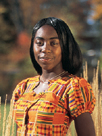 Lesley Boakye-Danquah ’03
Lesley Boakye-Danquah ’03
London, England
Major: Psychology
I was born in Ghana and raised in England, and at Bates, I meet lots of people I haven’t grown up with. Bates is my peephole to America. I’ve made lots of new friends here. People tell me when I try to make observations about Americans that Bates and Lewiston are not representative of all America. But I’ve got a piece of the picture and am able to view myself from another culture’s perspective. I moved to England at the age of two. My parents raised me as a Ghanaian in England. I saw the contrast of cultures there. Now I can look at that experience from the American point of view, from a different reference. It helps me see strengths and weaknesses of both cultures.
Bates has prepared me to go out into the real world. It is a safe place to formulate ideas, to grow. I plan to be a psychiatrist. The academic arena of the health professional field doesn’t have a lot of minority women. I haven’t come across lots written by or focused on people of color. Bates is a good place to develop that kind of realization because you have access to many resources and support by professors. Here, I feel privileged, nurtured. In England, medical school is purely scientific education. Surely it’s challenging, but not academically stimulating. Bates is academically stimulating.
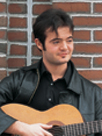 Alfonso Garcia Bailo ‘02
Alfonso Garcia Bailo ‘02
Zaragoza, Spain
Major: Economics
In Spain, I was influenced by the Spanish way of living. It was the only culture I knew, and I had no insight into other ways. When I came to Bates, I decided to open myself to new people and take advantage of what they had to teach me.
Bates is where I grew up. I became more mature and open-minded. I have very good friends here. I should have said that first. It’s an experience I wouldn’t have been able to get if I had stayed at home: to get to know this culture, to get to know people from all over the world. My friends have opened up my mind in many ways. I try to imagine this place without my friends. It would not be the same at all. If I ever need to talk, they are there for me. And I am there for them.
Professors here such as Kirk Read and James Hughes have encouraged and challenged me, but it’s up to me to decide to do my work. I have more contact here with teachers. In Spain, you are just a number. If you fail, you fail. Here, professors are interested in your progress and want you to succeed. You want to thrive.